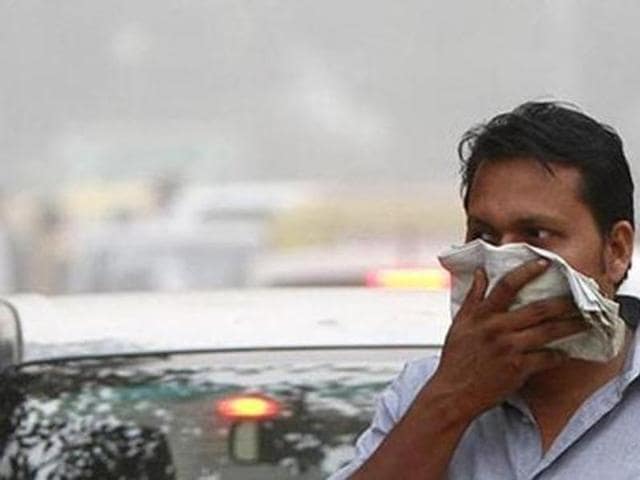Sales of air purifiers, masks grow with rising pollution levels
Delhi has experienced the worst smog in 17 years in the last two days where PM2.5 levels went upto 836.1 micrograms per cubic meter on Monday and was 645.2 micrograms per cubic meter on Tuesday while the permissible levels of PM2.5 levels in India is 60 micrograms per cubic meters.
Ram Agarwal woke up in the morning on Thursday, just two days after he experienced smog in Delhi post Diwali, made a few calls to a mask maker and drove all the way from Gurgaon to Khan Market to get hold of a high quality mask to breathe easy.

He was not alone at the Being Nirvana (Vogomask) outlet at Khan Market. In fact, the store manager, Manish, had to face an irate group of people because it had run out of stock and the mob lapped up nearly 100 units of mask in under 10 minutes as soon as it made its way to the shop.
Delhi has experienced the worst smog in 17 years in the last two days where PM2.5 levels went upto 836.1 micrograms per cubic meter on Monday and was 645.2 micrograms per cubic meter on Tuesday while the permissible levels of PM2.5 levels in India is 60 micrograms per cubic meters.
This phenomenon has led to a rush in capital for buying air Purifiers and masks. “It is the same trend every year. People become aware during the post Diwali period when air quality is at its worst. They start buying masks after they go through breathing difficulties,” said Manish. He added that sales of masks have gone up from 20 to 300 per day during the post Diwali period.
India, currently, has over 100 air-product companies that is looking to grab a larger share of the market, an industry expert said while noting that companies like Daikin, Blue Air, Philips and the latest entrant Xiaomi (that makes low-cost air purifiers) are the most popular ones in the market.
A Snapdeal spokesperson said that “over the last two years, we have seen a continuing uptick in the sale of both air purifiers and air masks, with year on year increase on the quantities sold.”
The spokesperson also said that the domestic e-commerce site has been witnessing a sharp rise in sale of PM 2.5 micron (one of the worst pollutants in air at present) masks. “Within the last month, this product has registered a 240% hike in sales. Sales of premium and stylised PM 0.3 micron masks is also on the uptake for the period of October-November with ‘masks’ emerging as the largest search query within the Automotive category on Snapdeal.”
Amazon’s India arm also said that it has witnessed three-fold increase in sales of air purifiers the Diwali month of October as compared to the previous month.
“About 50% of our orders are coming from customers belonging to cities like Delhi, Gurgaon and Bangalore apart from other metros. With the onset of winters and the growing smog/fog situation in cities during this time of the year, we expect the customer demand for Air Purifiers to peak over the next three months,” an Amazon spokesperson said.
The company also said that sales of pollution masks have jumped six times in the last few days with customer demand being 13 times over last year. “The highest number of orders for pollution masks were placed by customers on November 1st this year. The demand continues to be high from northern India with most orders coming from Delhi,” the spokesperson said adding that “generic pollution masks are seeing a high demand with Dettol Air Protect mask being the bestseller followed by the Atlanta Healthcare Cambridge N99 mask.”
However, companies and industry experts still believe that air purifiers have still some way to go before these products which come under the category of preventive health care goes mainstream.
“The Indian air pollution combating consumer durables market, according to independent studies, is around Rs 500 crore, and we are slowly seeing a rise in awareness of such products in people,” Jayati Singh Chakraborti, business head and director marketing of Air division of Philips Personal Health, told HT adding that “people are slowly seeing the point of preventive healthcare. If they can buy a smartphone worth Rs 50,000, an air purifier makes more sense.”
She also said that the Indian air purifier market can be divided into three categories -- residential, industry and institutional with each having a share of 30%, 20% and 50% chunk in the entire category. She also said that Philips is witnessing a rapid rise in the residential segment but also noted that price still remains a barrier for the industry.
“Buying behaviour of people change towards such products once they feel and see the effects of pollution,” Singh said.
Currently, several types of masks are available in India with N95 and N99 masks being the most sought after. “Surgical masks, which cost very less in single digits, are of no use. People are looking to buy more advanced masks that they can continue to use for longer periods with greater health benefits. Designer masks are also getting popular,” Manish said.





